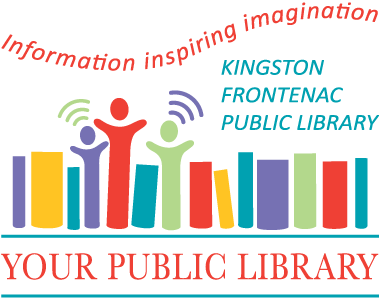Collection Development Policy
KFPL Statement of Policy
Collection Development Policy
1. Purpose
The purpose of this policy statement is to clarify the criteria used for selecting and acquiring materials, as well as the responsibility for maintaining the collections.
2. Scope
The Collection Development Policy applies to all formats in the Library collection, including print, non-print, audio-visual and electronic materials.
3. Guiding Principles
The mission of the Kingston Frontenac Public Library is to build and support community by creating inclusive spaces, services and collections that advance literacies and invite people to innovate, learn, explore and connect. The Library strives to provide a dynamic collection of materials that is regularly evaluated and available in a variety of formats to serve the needs and support the interests of all members of our community.
The Library aims to provide community-driven and community-focused collections. Community input is obtained through direct suggestions from the public, discussions with community groups and continuous evaluation of the needs of the various groups within Kingston and Frontenac County. Special consideration is given to materials with Kingston and Frontenac County authorship, content or relevance.
The Library endeavors to provide equitable access to its extensive collections through a multi-tiered service delivery model that rationalizes the location, scope and focus of collections. In addition, items may be delivered to any branch at the user's request. The materials budget is maximized through coordinated and controlled expenditure.
The Library does not keep, acquire or purchase material that the Canadian courts have found to be obscene, hate propaganda, seditious, or otherwise contrary to the Criminal Code and all applicable laws, including the Charter of Rights and Freedoms.
The Library’s Collection Development Policy fundamentally depends on the Ontario Library Association’s Statement on Intellectual Freedom and the Intellectual Rights of the Individual (2020). (See Appendix A)
4. Policy
4.1. Responsibility for Selection
The responsibility for the selection of material rests with the Chief Librarian/CEO who, in turn, delegates the selection and withdrawal of materials to the professional staff who are responsible for the collection on a day-to-day basis.
4.2. Selection Principles
The materials purchased for the Library are selected with the purpose of carrying out the mission, vision and values of the institution. To that end, the Library has established the following goals of selection:
-
To maintain a well-balanced and broad collection of materials for information, enjoyment, reference and research
-
To foster intellectual growth, lifelong learning and the formal and informal education and enlightenment of the community
-
To provide materials for the recreational and leisure pursuits of the public
-
To stimulate thoughtful participation in community affairs by providing access to a variety of opinions and ideas.
To assist in the process of selection, the following principles are used to judge the quality and the quantity of the items that are chosen:
-
Contemporary materials representing various points of view, which are of current interest and possible future significance, including materials which reflect current conditions, trends and controversies
-
Materials designed to increase the individual’s ability to function effectively as a member of society
-
Materials which provide access to practical information which develops the individual’s dependence on self, thereby enhancing the quality of life
-
Materials which provide an aesthetic experience, stimulate imagination and increase the individual’s potential for creativity
-
Materials, including the experimental or controversial, which may extend the individual’s capacity to understand the world in which they live
-
Materials which entertain and which may enhance the individual’s enjoyment of life
-
Source materials which thoughtfully interpret, document or illuminate the past
-
In addition to English, French and Indigenous language materials, materials which reflect the diverse linguistic or cultural heritage of the community.
-
Recognizing the responsibility to make works by Kingston Frontenac and Canadian writers widely available, the Library shall acquire Canadian materials in all categories.
4.3 Selection Criteria
When selecting materials for the collection, Library staff may consider:
Non-fiction
-
Purpose and importance
-
Authority and reputation
-
Accuracy
-
Style, clarity and presentation
-
Access
-
Format
-
Need
-
Demand
-
Price
-
Relationship to other items in the collection
-
Quality of illustrations or art
-
Reviews in library reviewing sources (e.g. Publishers Weekly, Library Journal)
Fiction
-
Style
-
Creativity
-
Characterization
-
Literary merit
-
Appeal
-
Demand
-
Price
-
Need
-
Relationship to other items in the collection
-
Quality of illustrations or art
-
Reviews in library reviewing sources (e.g. Publishers Weekly, Library Journal)
Suggestions for purchase are welcomed from members of the public. All suggested purchases are reviewed by library staff who apply the same selection criteria that are applied to all other materials purchased by the Library.
4.4 Accessible Collections
Many of the resources available at the Kingston Frontenac Public Library are suitable for patrons with print disabilities.
Vision Enhancements:
-
Downloadable audiobooks
-
Downloadable eBooks – the settings can be adjusted with the majority of our downloadable eBooks to suit personal preferences for text size and typeface
-
Books on CD
-
DAISY (Digital Accessible Information System) books
-
Large Print Books
Hearing Enhancements:
-
Many DVDs have a sub-title option
-
Many of our databases have text-to-speech capabilities
4.5. Children’s Collections
The Library’s children’s collections serve children from infancy through age twelve. Materials for these collections reflect the wide range of reading and interest levels that this age group includes. The children’s collections exist to encourage children to develop a lifelong habit of reading for both recreational and informational needs. Materials for children shall be chosen in accordance with the Kingston Frontenac Public Library’s overall collection development policy.
4.6. Teen Materials
Teen materials are selected to meet the informational and recreational needs of teens aged thirteen through eighteen. An effort is made to provide materials that support the developmental stages of all teens. The teen collections are not intended to be comprehensive, serving all the needs and interests of teens, nor is it the Library's intention that teens should be confined to the use of these materials. Materials for teens shall be chosen in accordance with the Kingston Frontenac Public Library’s overall Collection Development Policy.
4.7. Parental Responsibility
Responsibility for a child or teen’s choice and use of materials rests with their parent(s) or legal guardian(s). The Kingston Frontenac Public Library believes in the freedom of the individual, and the right and obligation of parents(s) or legal guardian(s) to guide, develop, interpret and maintain their own code of values in their family.
Library users of all ages have open access to the Library’s collections. Selection for the adult collection is not restricted by the possibility that children or teens may access materials their parent(s) or legal guardian(s) may consider inappropriate.
4.8. Textbooks/Homeschooling Needs
School libraries serve the curriculum needs of students. The Library does not attempt to acquire textbooks or other curriculum-related materials except as such materials may also serve the general public. The Library recognizes the need to provide a wide variety of cultural and recreational reading matter for students in traditional schools and those being homeschooled, and to provide basic materials for students seeking to complete assignments outside school hours.
4.9. Collection Maintenance
In order to maintain a current and relevant collection, it is necessary to withdraw materials from the library collections regularly and systematically. The following criteria are considered when withdrawing materials:
-
Accuracy
-
Timeliness
-
Physical condition
-
Frequency of use
-
Availability of other copies
-
Relevance to needs and interests of the community
If still needed, items may be replaced or rebound. Replacement depends on the demand for the title, the availability of more current materials on the topic and the extent of the coverage of the subject in the collection.
4.10. Review of Materials
The Kingston Frontenac Public Library Board regards an individual’s right of access to information through the public library as an important element of a democratic society. The presence of any material in the Library does not indicate an endorsement of its contents.
The content or manner of expressing ideas in material that is purposely selected to fill the needs of some Library users may be considered to be offensive by other Library users. The Library recognizes the right of any individual or group to reject Library material for personal use, but does not accord to any individual or group the right to restrict the freedom of others to make use of that same material. While Library staff will attempt to guide individuals and groups to materials suitable for their use, the ultimate responsibility for the choice made by the patron lies with the patron and/or their parent(s) or guardian(s).
Requests for review of Library materials must be made in writing by submitting a Request for Review of Library Materials form (see Appendix B). Acknowledgement of the request will be sent within 2 business days and a written response will be sent within 30 days.
Requests for review will be formally reviewed by Library staff following the process outlined in the KFPL Guidelines for Requests for Review of Library Materials document. Their decision will be communicated to the requestor. Patrons who are not satisfied with the response will be invited to meet with the CEO and members of the review team.
The final decision on any challenge to the collection rests with the CEO.
As outlined in the KFPL by-laws, community members wishing to address the Board on issues relating to the collection policy and its future development may request to attend a Board meeting as a delegation.
Information reports on challenges to Library materials are provided to the Board quarterly.
Some of the Library’s digital content is provided using third-party vendors and/or shared collections with other library systems. The Library subscribes to services in which the third-party vendor, and not Library staff, determines the specific titles or materials made available through the service. In these circumstances, the Library is unable to reconsider specific materials that Library users object to but may inform the third-party vendor or other library of user concerns and/or take these concerns into consideration in determining whether to continue using the vendor.
4.11. Labeling of Collections
The Library does not label materials to indicate approval or disapproval of the content. No catalogued book or other item will be placed on closed shelves, except due to space limitations or to protect it from damage or theft.
5. Related Documents
KFPL Guidelines for Requests for Review of Library Materials
6. Appendices
-
Ontario Library Association (OLA) Statement on Intellectual Freedom and the Intellectual Rights of the Individual (2020)
-
Request for Review of Library Materials form
7. Document Control
This policy shall be reviewed on an annual basis.
Original Policy Date: 2007 February
Last Reviewed: 2024 April
Changes made: see report to Board dated April 24, 2024
Next Review: 2025 April
Appendix A:
Ontario Library Association Statement on Intellectual Freedom and the Intellectual Rights of the Individual
Introduction
The Ontario Library Association and its divisions are committed to the fundamental rights of intellectual freedom, the freedom to read and freedom of the press, as embodied in the Canadian Charter of Rights and Freedoms.
Ontario Libraries have the important responsibility to facilitate expressions of knowledge, creativity, ideas, and opinion, even when viewed as unconventional or unpopular.
The Ontario Library Association declares its acceptance of the following principles for libraries:
-
Equitable access to library service to the public is based upon the right of the citizen, under the protection of the law, to judge individually on questions of politics, religion and morality.
-
Intellectual freedom requires freedom to critically examine and create other ideas, opinions, views, and philosophy of life, other than those currently approved by the local community or by society in general and including those ideas and interpretations which may be unconventional, uncommon or unpopular.
-
The free traffic in ideas and opinions is essential to the health and growth of a free society and that the freedom to read, listen, view, and create is fundamental to such free traffic.
-
Library governance ensures that the principles of intellectual freedom and expression of thought are upheld.
Library Service, Collections and Resources
-
It is the responsibility of libraries to maintain the right of intellectual freedom and to implement it consistently in the selection of books, periodicals, films, recordings, and other materials including the provision of access to electronic sources of information and access to the internet. Materials are not excluded from library collections based on race, place of birth, origin, ethnic origin, ethnicity, citizenship, age, creed, disability, family structure, sex, and sexual orientation.
-
It is part of the library’s service to its public to resist any attempt by any individual or group within the community it serves to abrogate, censor or curtail access to information, the freedom to read, view, listen or participate by demanding the removal of, or restrictions to library information sources in any format.
Library Programming, Events, and Space Bookings
-
It is the responsibility of libraries to maintain the right of intellectual freedom and expression by implementing it consistently when hosting programs and events within the public space of the library including rented public space by individuals and community organizations.
-
Libraries create welcoming community spaces where community members are free from discrimination and may engage in peaceful assembly. Libraries may cancel or deny permits to individuals or organizations when speech or displays are used in a way that is unlawful.
Applicable Legislation
Canadian Charter of Rights and Freedoms: Section 2(b) of the Charter of Rights and Freedoms protects “freedom of thought, belief, opinion and expression, including freedom of the press and other media of communication”.
Criminal Code: Section 63 pertains to Unlawful Assemblies and Riots. Section 297 pertains to defamatory libel. Section 318 pertains to hate propaganda.
Ontario Human Rights Code: Sub-section 13 pertains to infringing on freedom from discrimination.
Appendix B:
Request for Review of Library Materials form





